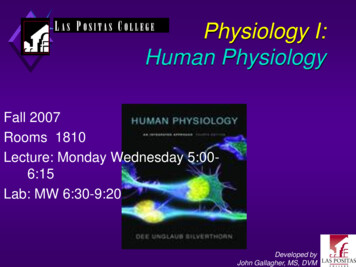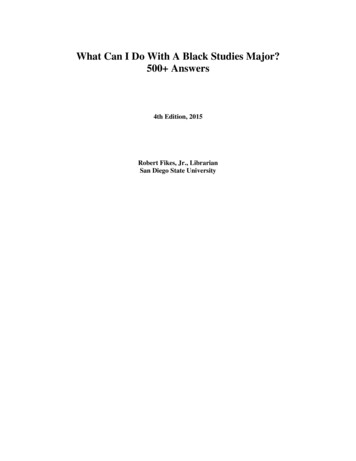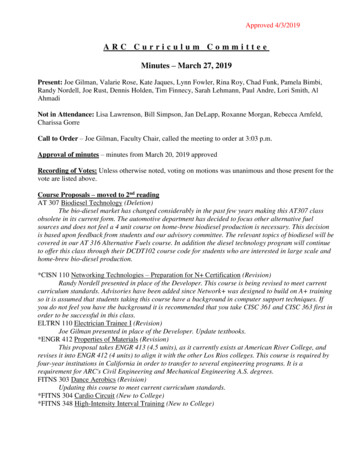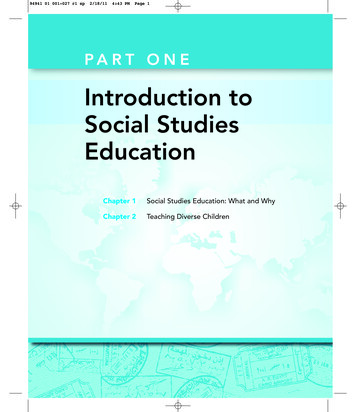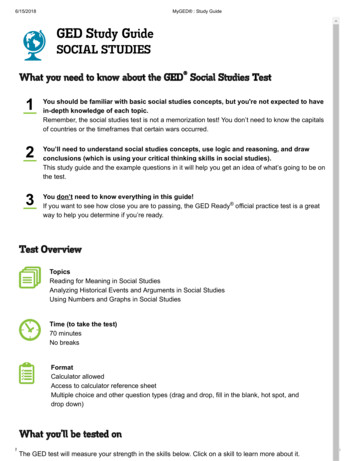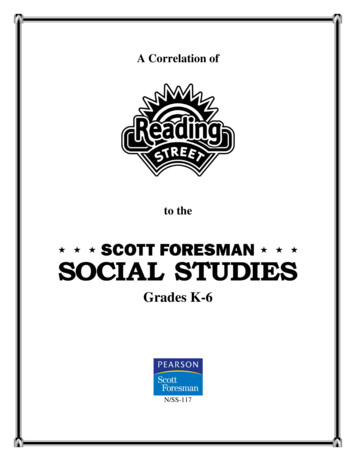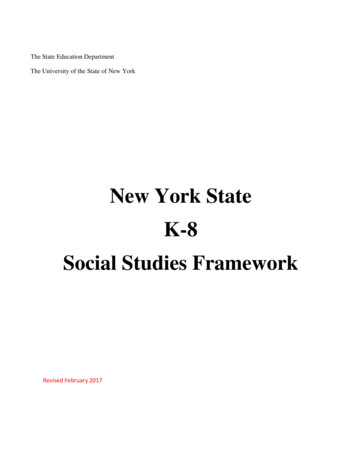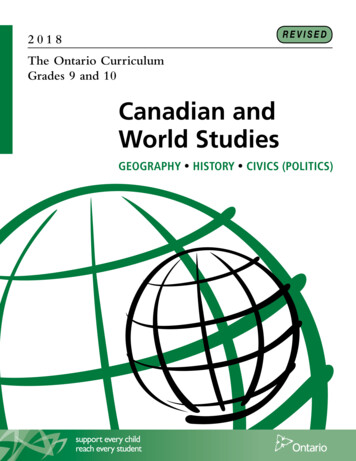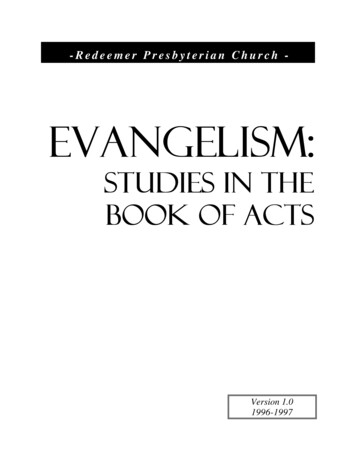
Transcription
-Redeemer Presbyterian Church -evangelism:Studies in thebook of actsVersion 1.01996-1997
ACTS CURRICULUMParticipants’ GuideT. Keller, 1996-97WEEK 1 Acts 1:1-8Preparing the Understanding for Mission1. Read Luke 1:1-4. How do these words help assure us of the historical accuracy ofthe events of the book of Acts (and the gospel of Luke)?2. 1:1. What does v.1 tell us about Luke’s theme or subject for the Book of Acts? Howdoes this theme contrast Christianity from other faiths?3. 1:3-8. Why do you think Jesus prepares the apostles’ minds (v.3) before he sendsthem power (v.4)? What was it about (cf. Luke 24:44-49)? What does the apostles’question reveal about their understanding of the kingdom? How does Jesus correctand inform their understanding?4. 1:2-8. What things are given to the apostles uniquely and what things are given tothe us along with the apostles?5. In what way is the apostolic ministry continuing in the church and in what way isit not? In what ways does this distinction influence the way we apply the book of Actsto ourselves today?acts1.pg1
Week 1 Project:DiscussionThe purpose of this course is to prepare your mind and heart to be effective witnesses forChrist’s kingdom in the world--in a small group community. The basis for this course is a studyof the book of Acts, which is a source for all the principles we need to be witnesses.In Acts 1 and 2 we see that Jesus prepared both the understandings and the whole lives of hisdisciples before he sent them out. He gave them both truth and power. But notice that thispreparation came in the context of community. They did not learn and grow into “sentness” asindividuals. They received both the necessary truth and power in community. Your small groupcommunity will be the setting for you to prepare yourselves for the same great experience andservice.As we study Acts 1 and 2, we will learn how to prepare one’s life for God to use. As we studyActs 3-7 we will learn how to grasp and share the gospel itself. As we study Acts 8-12 we willlearn how people come to Christ and are changed through conversion. As we look at Acts 1317 we will learn how to answer objections and how to make a case for the truth of Christianity.Finally, in Acts 18-19 we will learn about different strategies and means for sharing our faithwith others. When you get to this point (in March), your group will choose a way of outreach todo together, and you will spend 2-3 months putting your learning into practice, and thensupporting and supervising one another as you reach out.The following is an outline and schedule.OctoberPreparing your Life for evangelismWeek Oct 7Acts 1:1-8:Preparing the Understanding for MissionIntro to CourseOct 14Acts 1:6-26: Preparing the Life for MissionBuilding a “Altar” for a Life God Can UseOct 21Acts 2:1-36The Power ArrivesThe Power of the Holy SpiritOct 28Acts 2:37-47The New CommunityThe Power of the GospelNovemberPresenting the GospelWeek Nov 4Acts 3:1-26Peter Presents the GospelSharing a TestimonyNov 11Acts 4:1-31Peter Defends the GospelA Gospel OutlineNov 18Acts 4:32-6:7Counter-AttackGaining Confidenceacts1.pg2
Nov 25Acts 6:8-7:60“Oikos” EvangelismStephen Presents the GospelDecemberLeading People to FaithWeek Dec 2Acts 8:1-40The Ethiopian’s ConversionSpecial Joint Meeting: Joyful BoldnessDec 9Acts 9:1-43Paul’s ConversionA Gospel Outline: IIDec 16Acts 10:1-11:18Cornelius’ ConversionUnderstanding ConversionJan-FebPersuading People to BelieveWeek Jan 6Acts 11:19-12:24New Mission BreakthroughWhat is Apologetics?Jan 13Acts 12:25-13:52Paul Presents the GospelSoundbyte ApologeticsJan 20Acts 14:1-28The Gospel for PagansA Case for Christianity: IJan 27Acts 15:1-16:5 Clarifying the GospelA Case for Christianity: IIFeb 3Acts 16:5-40Three Surprising ConversionsProcess ApologeticsFeb 10Acts 17:1-34The Gospel for IntellectualsHelps and Hints for Handling ObjectionsFeb-March Learning Strategies for OutreachWeek Feb 17Acts 18:1-28Mission to CorinthSpecial Joint Meeting: Home Outreach BuffetsFeb 24Acts 19:1-22Mission to Ephesus: IStrategy 2: Discovering SeriesMar 3Acts 19:23-41Mission to Ephesus: IIStrategy3-4: Open Group. Oikos Intentional.Mar 10Acts 17-19Review: Paul’s StrategiesStrategy 5-6: Worship/Events. Service Projects.March-May Choosing Strategies and Reaching OutRemember, your group will choose a strategy together. Nothing will be forced uponyou. Whether you are “outgoing” or shy--there is a method that fits you.DISCUSSION QUESTIONSacts1.pg3
1. Share either one positive experience or one negative experience you’ve had inwitnessing to your faith. What one or two important things can be learned aboutsharing faith from these incidents?2. Share the two biggest obstacles for you with regards to witnessing.acts1.pg4
ACTS CURRICULUMParticipant’s Guide96-97Week 2Acts 1:8-2:12Preparing the Life for Mission1. 1:9. Why do the angels tell the disciples not to “stand looking into thesky”? What should the ascension mean to them and to us?2. Jesus told them not to begin their mission until they receive the gift ofthe Holy Spirit (1:4-5). What do they do to prepare for this gift in 1:13-14?3. What do they do to prepare for this gift in 1:15-26?4. Compare and contrast this incident in Acts 2:1-4 with Acts 4:31; 7:55;13:9; Luke 1:41, 67; 3:21-22; 4:1. In what ways is Pentecost unique, and inwhat ways is it repeatable?5. What is the significance of the multi-lingual proclamation of the gospelon the day of Pentecost? Why do you think God did it that way?Copyright – Tim Keller, 1996-97, Redeemer Presbyterian Church, 271 Madison Avenue, Suite 1600, New York, NY 10027
ACTS CURRICULUMParticipant’s GuideT. Keller, 1996-97WEEK 3 -Acts 2:5-39 The Power Arrives1. vv.5-13 What evidence is there that this was a worship service that the crowd cameto? What is the significance of that fact for us today?2. vv.5-11. What are the marks of the kind of corporate worship that makes a strongevangelistic impact? vv.12-13. What kind of impact did this first corporate celebrationhave on the audience?3. vv.14-36. What does Peter say in response to this first question? This is a gospelpresentation--outline its basic points. What kind of impact does this first gospelpresentation have on the audience?4. vv.37-40. What does Peter say in response to this second question? This is adescription of how to receive Christ--outline its basic points. What kind of impact doesthis have on the audience?5. What do we learn from this passage about the witness you should have as anindividual Christian? The witness we should have as a church?acts3.pg1
acts3.pg2
Week 3 Project - The Power Of The Holy SpiritIntroduction: The Holy Spirit's Coming - Before His death, Jesus told all those who werespiritually thirsty to come to Him and drink. He promised that rivers of living waters wouldflow out of them, speaking symbolically of the Holy Spirit who hadn’t been given, because Jesushad not yet been glorified (John 7:37-39). Jesus later said it was for our good that He was goingaway and He promised to send the Counselor, the Spirit of truth, to guide us into all truth andto tell us what is yet to come (John 16:7,13). Then, Christ's last words before His ascensionassured believers that they would receive power when the Holy Spirit came, that would result intheir being bold witnesses of His death and resurrection (Acts 1:8). Pentecost was fifty daysafter Christ was resurrected and just 10 days after His ascension. It is here, in Acts 2:1-36, thatwe see Jesus’ promises about the Holy Spirit fulfilled. On that day all the Christians were filledwith the Holy Spirit. Peter was empowered to explain what was happening. He describesDavid’s prediction of Christ’s resurrection and exaltation as fulfillment of prophecy and God’sforeordained plan. And he points to the gift of the Holy Spirit as proof of Christ’s Lordship.Today we have the gospels, the book of Acts and the epistles to teach us about the HolySpirit’s ministry in our lives and in the life of Christ’s church. We are inseparably linked to thisPerson as believers, yet many believers are confused about or ignorant of His ministry in ourlives. Ask yourself - "Theoretically, if the Holy Spirit left my life today, would it make anydifference in the way I respond to things?" (Leader: 10 min. #I; 10 min. #IIA; 10 min. #IIB; 15min.for prayer.I. The Holy Spirit's MinistryA. The Holy Spirit came to convict the world of sin, righteousness and judgment,according to John 16:8-11. What has been the world’s response, from OldTestament times until now, according to Acts 7:51-53?B. Assign these verses. Discuss how the Holy Spirit relate to all believers.1. I Corin. 6:19, 202. Eph. 1:133. Rom. 8: 11, 16 & 264. In I Corin. 12:7-13 we see that there is both diversity and unity in thebody of Christ, for the common good. Everyone profits as the spiritual giftsexercized that the Holy Spirit bestowed. He gives ‘severally, as Hereceive.acts3.pg3arewills, we
C. Once we better understand the theology of God’s Spirit at work in the churchand in us, what should be the implications in our walk with God and the life of thechurch?II. How Christians relate to the Holy SpiritA. What potential problems are exposed in the following verses?1. Eph. 4:30 (What solutions are offered in v.31,32?)2. I Thes. 5:19 (What solutions are offered in verses 20-24?)3. Gal. 5:17 (What solutions are offered in verses 16,18 & 25?)4. I John 1:5-10 once again shows us problems, or hindrances, that cankeep us from the Spirit’s fullness. How can these verses help us followthrough on obeying the solutions offered in the verses above and what’s atstake if we don’t?B. Eph. 5:18 is a command for believers to be filled with the Holy Spirit. It’s notan option, but He doesn’t tell us to do something beyond our grasp. Eph. 5:19-21and Col. 3:15,16 describe evidences of the Spirit’s fullness in our hearts and in thechurch. We speak to one another with songs, hymns, and spiritual songs, singingand making music in our hearts to the Lord, being thankful for everything andsubmitting ourselves one to another. Do you see the Spirit’s fullness beingmanifested in our church?III. Pray together about:A. Where you need deeper understanding, confessing obstacles to obedience in yourwalk and your desire to experience the Spirit’s work in yourself and in our church.B. ALTAR Accountability. In the whole group, or in smaller groups of 2 or 3, sharehow you are doing in the 3-5 things that you resolved to do in order to ‘buildan altar’ andhave a life more useful to God’.acts3.pg4
ACTS CURRICULUMParticipant’s GuideT. Keller, 1996-97WEEK 4 -Acts 2:40-47The New Community1. vv.40-41. Why do you think Peter tells them to save themselves from “thisgeneration”? What does this statement imply about the church, and about becoming aChristian?2. vv.42-47. Make a list of the characteristics and functions of the early church whichare evident in this passage.3. What do we learn here about the church’s a) ministry of learning and b) ministry offellowship?4. What do we learn here about the church’s a) ministry of worship and b) ministry ofwitness and service?The five ministries are also five “vital signs” of a Spirit-filled community.A. Ministry of learning in the truth. (1st sign: Theological depth)B. Ministry of loving in the fellowship.(2nd sign: Intimate relationships)C. Ministry of worship in the Spirit. (3rd sign: Joyous worship)acts4.pgD. Ministry of witness though words.(4th sign: Relentless evangelism)E. Ministry of service through deeds.(5th sign: Sacrificial service)1
5. Consider your own small group. How can it better manifest these ‘vital signs’?Consider your local church. How can it better manifest these ‘vital signs’?Week 4 PROJECT - The Power of the GospelIntroduction: In Acts 2:37, we see an example of the Spirit convicting the world of sin,righteousness and judgment (John 16:8-11) as Peter spoke to the crowd at Pentecost. He waspreaching the gospel boldly. We can too. (Leader: Look up each verse under I - 10 minutes,II - 5 minutes, III - 10 minutes and discuss the questions. Pace yourself to leave 10 to 15minutes to read number IV and pray.)I. Understanding where the power liesA. Romans 1:16 - What are we told about the gospel? How does this verse challengeour attitude about witnessing and to whom we witness?B. I Corin. 1:17,18 & 22-24 - What was Paul’s central message to the Greeks atCorinth, in spite of their intellects, morals and philosophies?C. I Corin. 2:1-5 - How did Paul proclaim the gospel that he said he was notashamed of and what comfort does this offer to us?II. Accepting the ministry God gave us.A. II Corin. 5:17-20 - What is God’s messenger called? What specifically does hedo? Where does he get his authority? What does God’s messenger talk about?What’s the message? How would you define ‘reconcile’? In this passage, who isreaching out to whom?B. Who have you had an opportunity to share this message with lately and how didthey respond?acts4.pg2
III. Because of the power of the Holy Spirit and the power of the gospel, the lives of manypeople were touched. We should be able to experience increasing confidence in communicatingthe gospel, as we continue to contemplate what it means to build and alter, make sacrifices tothe Lord, and trust the Holy Spirit to let the fire fall into our hearts as we live for Him in wordand deed.A. PRAY FOR OPPORTUNITIES this week to practice being a minister ofreconciliation. It is the God empowered ministry that has been given to eachbeliever! Accept it joyfully.B. ALTAR Accountability.During closing time of sharing and prayer--in the larger group, or in smallergroups of 2 or 3, ask each other and share: “How are you doing with the 3-5things that you resolved to do in order to “build and altar” and have a life moreuseful to God?”acts4.pg3
ACTS CURRICULUMParticipant’s GuideT. Keller, 1996-97WEEK 5 - Acts 3:1-26Peter Presents the Gospel1. What is striking about the healing of the crippled man? What does it tell us abouthow God works in our lives?2. What essential facts does Peter tell them about Jesus? What three kinds of evidencedoes he give for these facts (apart from his citation of Scripture)?3. How does Peter prove from the Bible that Jesus is the Messiah? Where did Peterlearn all this? What is the importance of seeing the centrality of Christ in the OldTestament?4. a)How does Peter tell his listeners they must do to receive Christ? Compare it withwhat he told his listeners in Acts 2. b) What does he say will be the results ofreceiving Christ?5. Summarize what can we learn about evangelism and witness from Peteracts5.pg1
Week 5 PROJECT - Sharing a TestimonyI. The Story of your spiritual journey. Have you experienced salvation? If so, you have amessage. Read I Peter 3:15. Let’s consider what we need to know to be ready:A. Write one word best describing your life during each of the three phases of yourspiritual journey to knowing Christ. Then, share them, by category, without comment.1)Before 2)How3)AfterB. Record 3 phrases or words that describe different attitudes, circumstances or actionsyou had before you came to know Christ, then share them.1)2)3)C. How would you summarize your differences and what you had in common?II. The story of Jesus Christ’s spiritual journey. Read Romans 10:14-17toA. How did you hear the gospel (who, where, when)? Consider finding a way this weekthank that person for influencing you to give your life to Christ. It might encourage them!B. What did you understood about the claims of Jesus Christ? This is the part ofyour testimony that must be clear and about HIM, not you!III. Proclaiming His praises! Read Isaiah 52:7. “ In biblical times, there was no CNN to takepeople into the battle zone via television. Instead, messengers ran from the war zones to informanxious family members and friends of the outcome of the battles. In this passage the message isone of victory, “Your God reigns!” (The Treasures of Encouragement Sharon Betters)A. Ps.66:16 says, “Come and listen, all you who fear God; let me tell youwhat He has done for me.”A1. What is an area where you have seen change in your life because of Jesus?true testimony relates to personal experience.2. How has God comforted you through relational conflict, deep loss, illness,financial or job pressures? You have a message!B. This is how we can preach without ‘preaching’! We can cultivate the habit of seeingALL of life as an opportunity to express gratitude to God! No child of God is exempt fromthis type of ‘preaching’ ministry’.IV. Read Jer. 20:9. Pray for our testimonies to burst forth from an inward fire! We ARE topreach the gospel, without ‘preaching’ and talk about Jesus! An energizing power is givenacts5.pg2
by the Holy Spirit to cleansed, trusting hearts. So confess your sins for continual cleansing andconsider this quote by Michael Green: ‘EVANGELISM IS OVERFLOW’!acts5.pg3
ACTS CURRICULUMParticipant’s GuideT. Keller, 1996-97WEEK 6 - Acts 4:1-31Peter Defends the Gospel1. What do we learn about unbelief from the reaction of the Sadducees, rulers, elders,and teachers of the law in contrast to the reaction of the people?2. What is particularly troubling to the leaders about the apostles (v.7, 13-14), andwhat link is there between this distress and their rejection of the gospel message?3. vv.8-12. What evidence and arguments are used by Peter in his defense? What is theleaders’ response?4. vv.23-31. What are the marks the prayer which brings down such power into thedisciples?5. Summarize. What do we learn about witness and ministry from this entire passage?Examine your hearts and our church in light of it.acts6.pg1
Week 6 Project: The Content of the Gospel: Part IRead silently and mark“!” - for something that helped you“?” -for something that raised a questionIf a Christian is going to share the faith, it is necessary to have in your head both an outline of thegospel and a summary of the gospel.In The Content of the Gospel: Part II (before Christmas) we will provide a single outline thatcan be memorized. Today, we discuss the need for a “gospel summary”.WHAT--is an outline of the gospel and a summary of the gospel?An outline of the gospel is a framework on which you can hang all the relevant information aboutChrist so that a listener can believe and receive him. A gospel outline is an “accordion” in that itcan be shared fairly briefly, but could also be expanded very fully, depending on thecircumstances.1. The "two diagnostic" questions of Evangelism Explosion, (see D.James Kennedy,Evangelism Explosion)2. The "Four Spiritual Laws" of Campus Crusade, (see numerous Crusade publications)3. The "Bridge Illustration" of Navigators, (see in Hybels, Becoming a ContagiousChristian)4. See a less well-known but fine presentation by John Guest called "A Faith That CanBe Yours", (in Risking Faith)A summary of the gospel really needs to be brief--it should 30 seconds to a minute in length atthe most. It is much shorter than the full presentation that needs to be given to someone who isvery ready to believe.WHEN--use a gospel summary or outline?An outline of the gospel should be used when a listener is genuinely interested in knowing whatthe Christian faith is about, and how to become a Christian. A summary of the gospel is notsufficient for a person who wants to become a Christian. Rather, it is for the early stages of aconversation or a relationship with a non-Christian. Its purpose is to get the basic idea of thegospel out on the table. Mainly, it is to distinguish Christianity from mere "religion and morality",and to give a gripping definition of sin and grace.The goal of the brief summary is to get the non-Christian to reveal his or her particular problemswith the gospel, the personal barriers against faith. Then, these barriers can be worked through.After they have been, you can provide a gospel outline that more fully explains the faith. Thereason we provide a "brief" summary of the gospel is so that, eventually, your sharing of the faithwill be very directed at the person’s particular and specific issues. If you provide first a longeroutline of the gospel, you probably will be "scratching where the person is not itching" and thus(perhaps) you may bore them.acts6.pg2
HOW--to use a gospel summary.Here are several examples. You may prefer to write your own.Do-Done summary (see example in Bill Hybels, Becoming a Contagious Christian)."Do". All forms of religion, (formal or informal), are spelled D-O, because they tell us wehave to perform good works and obey moral and religious laws in order to find God, toachieve forgiveness, nirvana, or peace. But you can never be sure you have done enough."Done". But Christianity is spelled D-O-N-E because God sent his son to earth to live thelife we should live, and die on the cross to pay the debt we should pay for wrongs we'vedone. Buddha said "Strive w/out ceasing"; Jesus said "It is finished". (John 19:30)To become a Christian is to turn from "do" to "done" by asking God to accept you forJesus' sake and commit to live for him.Sin-Salvation summary (based on a paragraph in John Stott's The Cross of Christ):Sin is us substituting ourselves for God, putting ourselves where only God deserves to be-in charge of our lives.Salvation is God substituting himself for us, putting himself where only we deserve to be-dying on the cross. Read II Cor.5:21.To become a Christian is first to admit the problem: that you have been substitutingyourself for God either by religion (trying to be your own savior by obedience to moralstandards) or by irreligion (trying to be your own lord by disobedience to moralstandards). And second to accept the solution: asking God to accept you for Jesus' sakeand know that you are loved and accepted because of his record, not yours.Slavery-Freedom summary (see What Does It Mean To Know God?)Slavery. We were built to live for God supremely, but instead we live for love, work,achievement or morality to give us meaning and worth. Thus every person, religious or unis worshipping something to get your worth. But these things enslave us with guilt (if we failto attain them) or anger (if someone blocks them from us) or fear (if they are threatened)or drivenness (since we must have them). Sin is worshipping anything but Jesus--and thewages of sin is slavery. Freedom. As a fish is only free in water, we are only free whenserving Jesus supremely. For he is the only source of meaning that we cannot lose(freeing us from fear and anger) and that is a free gift (freeing us from guilt anddrivenness). Read Matt.11:28-30. His "yoke" is the only one that does not enslave.Law-Love summary.Law. Some see God as simply Judge who demands we be moral and righteous. If God isnot a Judge there is no hope for the world--how else will wrong be punished?Love. Some see God as simply a Father who loves us and doesn't want to punish. If Godis not a Father there is no hope for us--how else can we be forgiven?Problem. God is both. If a father was also a judge, and a guilty child was brought beforehim, he could not just acquit. How can God's Law and Love must be reconciled?acts6.pg3
Solution. When God sent his Son to die in our place, the judge was judged. On the crossGod's justice and his love was satisfied at once, "that God might be both just andjustifier [judge and father] of those who believe" (Rom.3:26).Discussion Questions1. Discuss those things in the reading that most helped you--things you marked withan ‘!’2. Discuss those things in the reading that raised questions--things you marked withan ‘?’3. Which gospel summary is the most helpful to you? Why?4. Do you have a summary that you have heard or that you use that is not representedhere? Share it.acts6.pg4
ACTS CURRICULUMParticipant’s GuideT.Keller, 96-97Week 7 - Acts 4:32 - 6:7Counter Attack1. 4:32-37. How does v.31 lead to v.32? In what ways does the filling of theHoly Spirit and boldness (v.31) relate to the radical sharing of materialpossessions?2. 4:32-33 and 6:6-7. How do we see word-witness relate to deed-witness inthe life of the early church? What implications does this have for your ownwitness here and now?3. 5:1-12. What was the sin of Ananias and Sappphira? Why was it soserious and so seriously dealt with? How can we a) fall into a similar trap,and b) avoid it?4. 5:12-42. Survey this long passage and make a list of the characteristicsof a spiritually vital church.5. 6:1-6. What does this passage teach us about the marks of a vitalchurch?acts7.pg1
Week 7 Project:Gaining ConfidenceIce Breaker: What is the key ingredient in gaining confidence in lifestyle evangelism?I. Let’s review what we’ve learned through our study in Acts and our projects that should help usdevelop confidence in being our King’s representatives:A. The Power of the Holy Spirit - Read Romans 8:6 & 111. What are several examples we’ve seen in Acts that have demonstrated“the power of the Holy Spirit” being unleashed in ordinary men?2. What would keep you from experiencing this confidence? How can weget the truths about the Holy Spirit in Scripture to help us gain confidenceseeking to represent Christ to others in both word and deed?B. The Power of the Gospel - Read I Corin. 1:17,181. What are several examples of the Gospel’s power we’ve seen in Acts?2. What would keep us from taking steps to witness if we believe A & B?How can we get these truths to motivate us into action?C. Sharing a Testimony - We shared with one another words, phrases and sentencesdescribing our spiritual journeys to faith in Jesus Christ, using thesimple outline of before, how & after. Has anyone done this lately? (1 or 2 share)D. The Content of the Gospel1. What example of an outline of the Gospel have we seen in our Actsstudy? Have you shared an outline of the Gospel lately? (1 or 2 share)2. A summary of the Gospel is for the early stages of conversion, givingthe basic idea of the gospel, defining sin and grace, and exposing faithbarriers.Have you tried using one of the examples? (1 or 2 share)II. Gaining confidence in lifestyle evangelism will come with practice. As you are a “doer of theWord and not a hearer only,” you will find yourself gaining confidence. Obedience to the light you’vebeen given on a subject will always result in strengthened faith and confidence in God working throughyou with the Holy Spirit’s power.A. Pray for an opportunity to share your testimony (or part of it), an outline of theGospel (using a booklet or the Scriptures), or a summary of the Gospel (like: Do-Done,Sin-Salvation, Slavery-Freedom, Law-Love, Problem-Solution).B. Take the initiative to do this. The Spirit empowers obedience. Expect God toanswer your prayer and honor your obedience and the desire to see others knowChrist. The fire will fall on the altar of a pure, obedient, faith-filled, praying heart!acts7.pg2
acts7.pg3
ACTS CURRICULUMParticipant's GuideT.Keller, 96-97Week 8 - Acts 6:7-7:60Stephen Presents the Gospel1. 6:8-15. What does this passage tell us about why Stephen’s ministry wasso effective? Which of his characteristics do you lack? What can you do togrow in that area?2. 6:13-14. Summarize Stephen’s message from his accusers. How does thegospel change the way we look at the temple and the law? Why is itsignificant that the future apostle Paul listened to this Stephanic gospelpresentation (8:1)?3. 7:1-50. How does Stephen’s very long speech answer the original question(v.1)? How does each section about Abraham, Joseph, Moses, and Solomonadvance his basic argument? How does he adapt his argument to thepremises and nature of his audience?4. 7:37-43. How do these verses address the place of the law in Israel? 7:5153 How does this charge follow from his whole speech?5. 7:54-8:1. What happens to Stephen to prepare him for death so well? Whydoes it lead to courage and forgiveness (v.60)? How can we know more ofthis ourselves?acts8.pg1
Week 8 Project - “Oikos” Evangelism: IRead silently and mark“!” - for something that helped you“?” -for something that raised a questionThe Main Method of EvangelismIn the book of Acts, especially in the chapters 10 and following, the “main method” ofevangelism of the early church emerges. It is not a program or a well-oiled scheme--itis what we will call “oikos evangelism”.“Oikos” is the Greek word for “household”, but we must be careful not to read into thisterm our own concept of the nuclear family. A Graeco-Roman household containednot only several generations of the same family, but also included servants, thefamilies of servants, friends, and even business associates. Essentially, new believersshared their faith with other members of their “oikos”, and thus people came to faiththrough web networks of relationships.Not only church history, but modern research has shown that the vast majority ofpersons come to faith through the witness of a friend, relative, or associate--notthrough massive programs or campaigns.Biblical examples“The following day [Peter] arrived in Caesarea. Cornelius was expecting them, andhad called together his relatives and close friends. As Peter entered the house,Cornelius met him.” Acts 10:24“On the Sabbath, we went outside the city gate to the river.We sat down and beganto speak to the women who had gathered there. One of those listening was Lydia, adealer in purple cloth from the city of Thyatira.The Lord opened her heart to respondto Paul’s message. When she and the members of her household were baptized, sheinvited us to her home. ‘If you consider me a believer in the Lord,’ she said, ‘come stayat my house’.” Acts 16:13-15“He then brought them out and asked, ‘Sirs, what must I do to be saved?’ Theyreplied, ‘Believe in the Lord Jesus, and you will be saved--you and all your household.’Then they spoke the word of the Lord to him and to all the others in his house. At thathour of the night the jailer took them and washed their wounds; then immediately heand al
As we study Acts 1 and 2, we will learn how to prepare one’s life for God to use. As we study Acts 3-7 we will learn how to grasp and share the gospel itself. As we study Acts 8-12 we will learn how people come to Christ and are changed th

